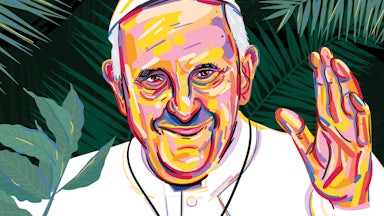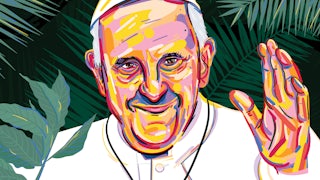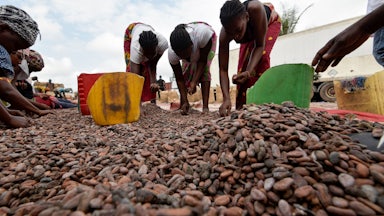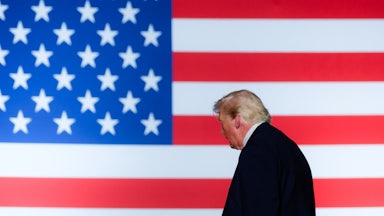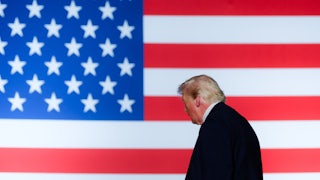It sounds a lot like extortion: After more than two years denying that runaway deforestation in the Amazon is a real problem, the Brazilian government now says it will protect the rain forest if the United States ponies up. Wednesday, on the eve of Joe Biden’s virtual climate summit with dozens of world leaders, President Jair Bolsonaro’s environment minister asserted that his country would cut deforestation by up to 40 percent in one year in exchange for $1 billion from the international community.
There is something to the general idea of rich countries paying developing ones to secure carbon sinks, finance sustainable development, and deal with the effects of climate change, given rich countries’ disproportionate contribution to the climate crisis. But as everyone from Leonardo DiCaprio and Katy Perry to Brazilian legislators, governors, and civil society groups point out, there are several reasons to be wary of negotiating with Bolsonaro. For one thing, Bolsonaro’s administration is notoriously apathetic or outright hostile to conservation efforts. When former President Dilma Rousseff joined the Paris climate agreement in 2015, Brazil committed itself to ending illegal deforestation by 2030. But under Bolsonaro, a far-right extremist elected in 2018 with a tacit promise to relax enforcement of strict environmental legislation, deforestation has reached its highest point since 2008. The administration is now presenting the aims of half a decade ago as the best-case scenario.
It’s not clear what more money would accomplish in this case. As Norway’s minister of climate and environment recently noted, “Decreasing deforestation in the short term is a matter of political will, not a lack of advance financing.” From 2008 to 2018, Norway poured $1.2 billion into the Amazon Fund, which pays Brazil to protect the rain forest. It knows better than most governments that Brazil has the technical ability to rein in deforestation if it wants to. Brazil’s National Institute for Space Research, or INPE, for example, has world-class tools to monitor the expanse of the Amazon rain forest, which is crucial for policy planning and implementation. Using its own national know-how, center-left Workers’ Party governments cut deforestation by 80 percent between 2006 and 2012. As The New York Times reported at the time, the government “carved out about 150 million acres for conservation—an area roughly the size of France—and used police raids and other tactics to crack down on illegal deforesters.” No amount of money will compel Bolsonaro to confront the illicit logging interests and rapacious cattle ranchers that drive deforestation today. Doing so would require making commitments that are anathema to Bolsonaro’s political agenda.
There’s also a specific reason to distrust that Bolsonaro is serious about changing course: His environment minister, Ricardo Salles, still has a job. Salles has distinguished himself as one of the savvier members of the carnival of horrors that has been Bolsonaro’s Cabinet, but he has shown himself to be an anti-conservation zealot. Before Bolsonaro’s election, Salles was environment minister for the state of São Paulo. In that role, he was found guilty of favoring private business interests at the expense of environmental safeguards (despite overwhelming evidence, Salles’s conviction was overturned last month). In 2019, as massive swathes of the Amazon went up in smoke, Salles posited that the best way to protect the rain forest is to “monetize” it. Most recently, the head of Brazil’s Federal Police in the state of Amazonas accused Salles of interfering in an investigation into illegally harvested timber seized late last year, valued at over $20 million. In an attempt to signal a new foreign policy direction in the wake of Biden’s election, Bolsonaro recently fired his conspiracy-minded foreign minister. Salles’s endurance in Brazil’s top environmental position speaks volumes about the government’s real commitments.
Salles has said new international aid would allow the government to expand the presence of security forces across the Amazon, but it is not clear this would reduce the problem of fraud and corruption in logging and land grabbing. A damning new report by Xingu+, a network of Indigenous activist groups and civil society organizations, found that deforestation under Bolsonaro is spreading in the Xingu river basin, a critically important part of the rain forest. “The advance of deforestation, land grabbing and illegal mining has placed the Apyterewa, Cachoeira Seca, Ituna Itatá and Trincheira Bacajá Indigenous Lands at the top of the ranking of the most deforested in the Amazon in 2020,” the report, based on near real-time deforestation radar monitoring, lamented. The people who live in the Xingu river basin—an area nearly the size of France—are facing an onslaught of rapacious economic forces the Bolsonaro government has to date shown no interest in restraining.
In fact, the president has a history of blaming Amazon fires on the Indigenous people who live in the rain forest rather than his allies in agribusiness, whom he openly supports in a campaign to develop the Amazon against Indigenous wishes and land rights. That’s despite a recent study showing that Latin America’s Indigenous peoples, when given full property rights over their lands, are hands-down the best stewards of the rain forest. They are understandably wary of state security forces in their vicinity.
Brazil and the international community are not on the same page when it comes to establishing a standard for foreign assistance. Salles essentially wants to be paid to crack down on deforestation, whereas other countries want to see results before committing any more funds. This is a tricky impasse. The president seems to think he is in a position to negotiate, but it is not clear what leverage he possesses other than letting the hostage—the Amazon rain forest—die. This is as close to extortion as Brazilian foreign policy has come since World War II, when it flirted with the Axis to scare Washington into offering a massive aid package. Thinking he can dictate favorable terms at this late hour of his disastrous administration is another of Bolsonaro’s many delusions.
Brazil is not used to being an international pariah. But Latin America’s largest nation entered the U.S.-led climate summit Thursday as one of the most worrisome wrongdoers of the world’s major democracies. This is not so much because of Brazil’s greenhouse gas emissions—which are much less than those spewed by the United States, China, India, and Russia—but because of the current government’s appalling track record on Amazon deforestation. As Mongabay, a leading nonprofit conservation and environmental outlet, put it, “The world’s rainforests remain a carbon sink, stashing away 7.6 billion metric tons of carbon dioxide every year.… But in the last 20 years alone, forests in Southeast Asia, particularly Indonesia and Malaysia, have turned into net emitters of carbon, thanks to the spread of plantations, raging fires, and loss of peatlands.” The Amazon accounts for more than half of the planet’s rain forest cover. Its degradation amounts to a ticking carbon bomb.
Sustained critical attention from abroad will likely have one of two outcomes. On one hand, it might force the Bolsonaro administration finally to make some of the adjustments demanded by the international community. It is strange to think that simply enforcing existing legislation would be a concession on Bolsonaro’s part, but given his past criticism of Brazil’s stringent environmental laws, it would. On the other hand, it could harden Bolsonaro’s aggrieved nationalism, a rhetorical strategy he has embraced whenever international observers question his government. In 2019, French President Emmanuel Macron suggested the fires in the Amazon be a priority for the G7, a move Bolsonaro called “unacceptable” and symptomatic of the “colonialist mindset” of foreign powers. Bolsonaro openly pleaded with Donald Trump, whom he considered a close ally, to block any discussion of Brazil in an international forum where it was not represented.
At Biden’s virtual climate summit Thursday, Brazil’s president asserted that his administration can and will do more to rein in runaway deforestation. In addition to reiterating the request for more money, he recommitted to the goal established six years ago of ending illegal deforestation by 2030, spoke generally about increasing enforcement, and praised Brazil’s embrace of renewable energy sources. He also used the fact that Brazil is a global leader in clean energy to subtly reframe the standard by which the nation is judged. He characterized the climate crisis as primarily stemming from the long-running fossil fuel use of major industrial powers rather than conservation lapses. Brazil, he noted, contributed less than 1 percent of all those harmful emissions.
These are fair points but not sufficient reason to give Bolsonaro’s government more money. In the coming months, we’ll see whether the president follows through with the vague course of action he outlined on Thursday morning. His record, which includes a catastrophic mismanagement of the Covid-19 pandemic, suggests this is highly unlikely. For now, it would be more helpful for the international community to extend support directly to those on the front lines of the devastation his administration has overseen.

